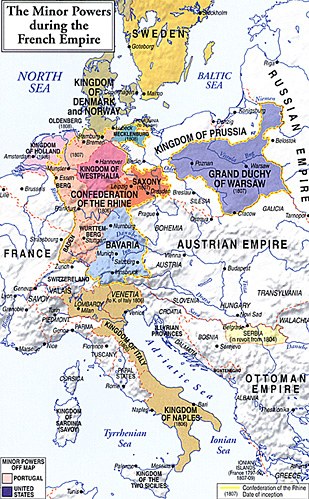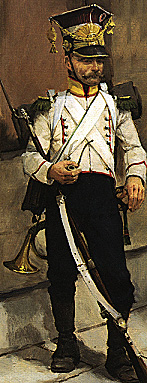
Throughout the period there were a number of minor powers allied with or against Napoleon and France. Three of these were thrones established by Napoleon and given to his family: Italy, composed of 6.5 million people in Lombardy, Venetia, and much of the old Cisalpine Republic, of which Napoleon proclaimed himself King in 1805, making his stepson Eugene Beauharnais its Viceroy; Holland went to his brother, Louis, as King in 1806 (but was extinguished by annexation in 1810); and the 4.5 million inhabitants of Naples, amputated from the Kingdom of the Two Sicilies, received his brother, Joseph, as its first King in 1806, followed by brother-in-law Marshal Murat in 1808. While Italy provided substantial numbers of troops of a quality commensurate with the French, Holland and Naples reluctantly provided fewer military resources, with Neapolitan troops proving to be utterly unmotivated.
A more important source of military support was garnered from the constituents of the Confed-eration of the Rhine, Napoleon's July 1806 rationalization of the multitude of German states and principalities in the wake of his 1805 defeat of Austria and his elimination of the Holy Roman Empire. Initially composed of 16 entities, another 19 joined in the ensuing years to total some 15 million people. The principal players were Bavaria (3.3 million), Westphalia (2 million, a kingdom created for brother Jerome Bonaparte), Saxony (2 million), Wurttemburg (1.3 million), and Baden (950,000), to which was added the newly created Polish Grand Duchy of Warsaw (3.8 million and nominally under Saxony, whose king was grand duke).
Polish troops had served France since the latter's aid to the nationalist uprisings in the 1790s when Poland was extinguished by partition. Other minor states also provided considerable numbers of troops to the Imperial French cause.
Although the Confederation collapsed with the Allied advance in 1813, Napoleon's state-building greatly facilitated Germany's eventual consolidation. The Danes sought to remain neutral, but their navy was too substantial to be ignored by Britain, and Denmark's membership in the Russian-sponsored League of Armed Neutrality resulted in a British attack, which destroyed its fleet at Copenhagen in 1801.
 Vistula Legion 16th Regt. bugler at right © Keith Rocco
Vistula Legion 16th Regt. bugler at right © Keith Rocco
That neutrality vanished in 1807 when Britain again attacked to prevent the Danish fleet from falling into French hands; Denmark then angrily embraced a French alliance which it maintained until 1814, to its eventual disadvantage.
Switzerland (1.5 million), long a French political and military battleground, provided numbers of excellent soldiers for hire, not only to France, but to Spain as well. Sweden hardly played a military role until 1813, although it fought a brief and humiliating war with Russia in 1808-1809, which resulted in the loss of Finland and the Aland Islands. Although Sweden had engaged in a series of alliances with both sides, its selection of Napoleon's disgraced Marshal Bernadotte as the Crown Prince in 1810 found Sweden ironically and actively at war against France in 1813-1814. Bernadotte went on to establish the Swedish dynasty that still reigns.
Another, more active and very important ally against France was Portugal (population 2 million). Building on an old alliance, Portugal permitted Britain to retrain, re-officer, and reorganize its army in 1808 and then to integrate it with Britain's expeditionary force from 1810. The approximately 45,000 Portuguese troops were crucial to the French defeat in the Iberian Peninsula.
Lastly, two other countries, not often thought of as minor powers, also played important parts in the various conflicts. The United States (7 million) contested its navigation rights in the Caribbean with France in a quasi-war from 1798 to 1801 and then fought Britain on land and sea over similar issues in the War of 1812. Not only did this war cut off an important supply of grain for Wellington's Peninsular army, but it diverted significant strength from being available for the Waterloo campaign in 1815. Meanwhile, the U.S. nearly doubled its size with the $15 million acquisition of Louisiana from Napoleon in 1803. On the other side of Europe, Serbia, turning to Russia for aid, eventually fielded some 70,000 troops against the Ottoman Empire during its 1804-1813 battle for independence, and for that reason alone merits mention as a minor power.
More Powers of the Napoleonic Era
- France
Great Britain
Duke of Wellington Profile
Austria
Archduke Charles Profile
Russia
Field Marshal Kutusov Profile
Prussia
Field Marshal Blucher Profile
Spain
The Peninsula War
Ottoman Empire
Minor Powers
Back to Table of Contents -- Napoleon #17
Back to Napoleon List of Issues
Back to MagWeb Master Magazine List
© Copyright 2001 by Napoleon LLC.
This article appears in MagWeb (Magazine Web) on the Internet World Wide Web.
The full text and graphics from other military history magazines and gaming magazines are available at http://www.magweb.com
Order Napoleon magazine direct